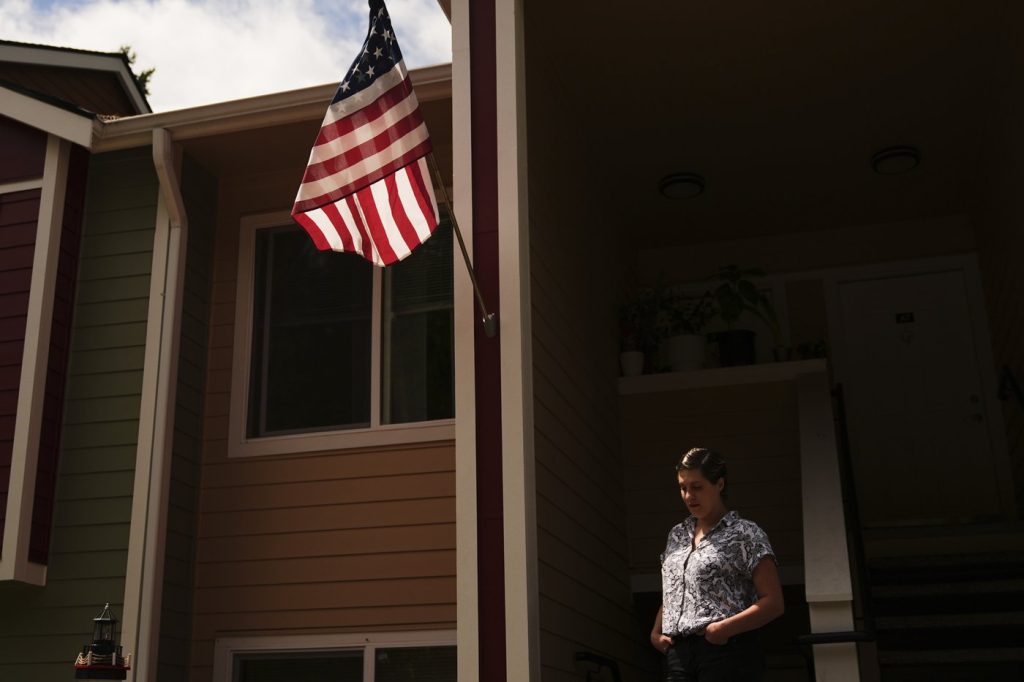WOODINVILLE, Wash. (AP) — Havalah Hopkins, a 33-year-old single mother living in a government-subsidized apartment in Woodinville, Washington, frequently accepts catering gigs to supplement her income. Earning $18 an hour plus delivery fees and tips, she finds this work more financially viable than minimum-wage job opportunities. Despite her efforts, the struggle to make ends meet remains a constant challenge as she raises her 14-year-old autistic son in a setting where stable housing is becoming increasingly scarce.
Hopkins expresses her frustrations about the cycle of hardship she faces, stating, "It’s a cycle of feeling defeated and depleted, no matter how much energy and effort and tenacity you have towards surviving." Her situation is precarious, particularly as recent policy movements threaten the rental assistance she relies on. With only about 25% of low-income households eligible for rental assistance through the U.S. Department of Housing and Urban Development (HUD) actually receiving it, her stable housing situation could soon be at risk due to proposed changes from the Trump administration.
The administration aims to introduce a two-year time limit on HUD’s rental assistance programs, which would significantly alter the longstanding approach of supporting low-income households. HUD Secretary Scott Turner argues that such limits would address waste and fraud within public housing and Section 8 voucher programs, contending that assistance was never intended to be permanent. "It’s broken and deviated from its original purpose, which is to temporarily help Americans in need," Turner commented during a recent congressional budget hearing.
This proposed policy change has caused growing concern among housing advocates and families dependent on these subsidies. Research from New York University suggests that if a time limit were imposed, approximately 1.4 million households could lose their vouchers, predominantly affecting working families with children. This shift would likely lead to widespread evictions, destabilizing vulnerable households that rely on HUD’s support to secure their homes amidst soaring rental costs in many regions.
Analyses have shown that about 70% of households potentially impacted by the proposed time limit have been receiving assistance for more than two years already. The vast majority of those receiving HUD support are families, and the prospect of losing housing assistance could have detrimental impacts on children's well-being, as stable housing is a crucial factor in their health, education, and future opportunities.
Hopkins, who pays only $450 a month in rent due to her subsidy, fears that this proposed change would lead to homelessness for her and her son. She reflects on the emotional toll such uncertainty takes, saying, "A two-year time limit is ridiculous. It’s so disrespectful. I think it’s dehumanizing — the whole system." The anticipated policy shift embodies deeper concerns about the effectiveness of time limits in achieving self-sufficiency, with critics asserting that it could lead to further chaos and instability for working families.
Opposition to the proposed changes spans both political parties, with some arguing that time limits do not effectively facilitate the transition to self-sufficiency. Democratic Representative James Clyburn emphasized the absence of evidence supporting the idea that time limits would reduce HUD costs or aid working families struggling with multiple jobs. Comments by HUD spokesperson Kasey Lovett suggest a belief that long-term reliance on government aid discourages self-sufficiency among able-bodied recipients, hinting at ongoing debates about the impact of rental assistance policies.
The possible implementation of such time limits faces considerable uncertainty, with more than half of current recipients excluded due to being elderly or disabled. The remaining population relies on complex, non-tested policies that have seen limited success in practice. In previous attempts to impose time limits, many housing authorities have abandoned the efforts due to their adverse effects, and the looming threat has created worries among landlords as well, many of whom depend on stable rental assistance programs to ensure reliable income.
The future of HUD’s budget and policy direction remains undetermined. With congressional committees currently reviewing HUD’s financial plans, there is no clear indication that the administration's proposed time limits will be adopted. Nonetheless, advocates for affordable housing remain vigilant against potential changes that could severely impact the livelihoods of millions of low-income families across the United States.











